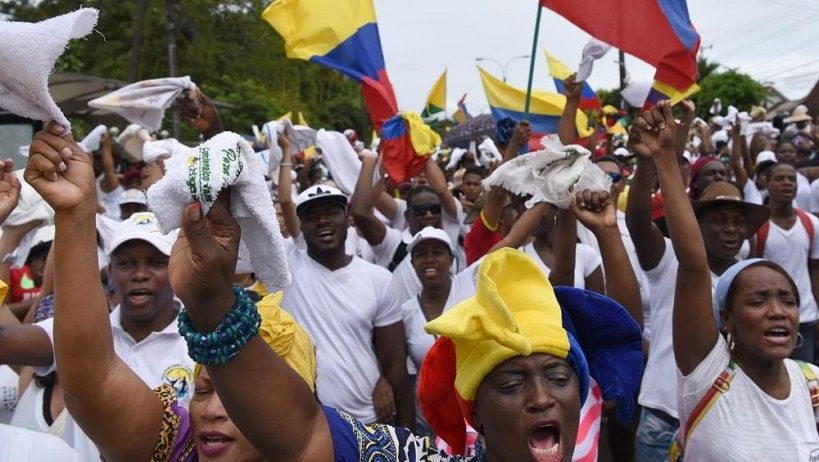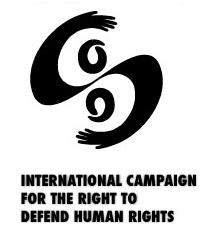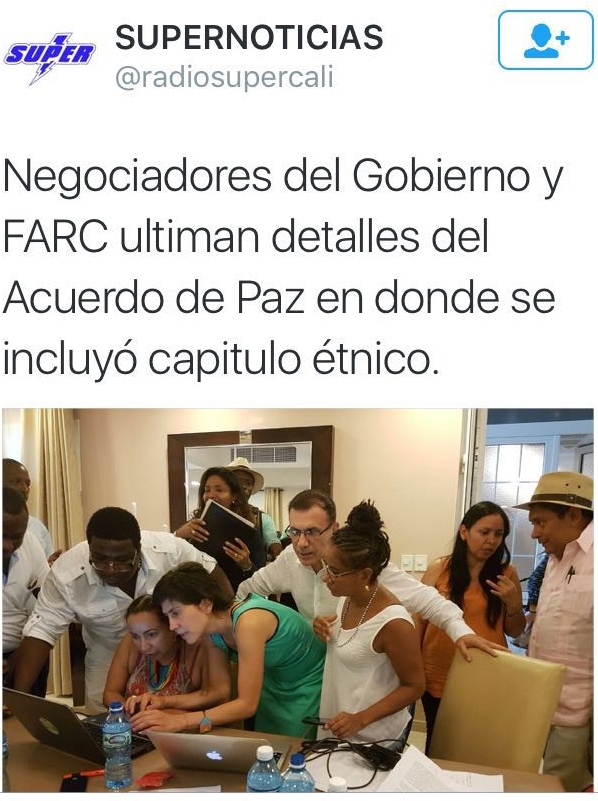
Desde el 16 de mayo al 6 de junio del 2017, 89 sociedades civiles en el puerto de la ciudad de Buenaventua llamaron a una huelga, demandando que el gobierno colombiano les provee infraestructura básica (como sanitación, vivienda y agua limpia), servicios públicos (como la educación y servicios médicos) y la creación de trabajos estables. 80% de los residentes son de descendencia afro-colombiana quienes vive en pobreza sin ninguno de estos servicios públicos a pesar que el puerto de Buenaventura es el más importante de Colombia y genera billones de dólares en redito. Sin embargo, la privatización neoliberal del puerto ha causado una baja en los salarios y lo ha puesto en las manos de dueños privados. También la expansión del puerto a destruido manglares costales donde están los sitios de pesca. Esta huelga refleja los años de abandono del gobierno, falta de inversión y el racismo estructural.

La huelga estuvo muy organizada, disciplinada y pacífica. Los manifestantes también utilizaron bloqueos para parar el tráfico de camionetas hacia el puerto hasta que el gobierno negociara de buena fe con ellos. En vez de negociar, el gobierno mando la Unidad Antidisturbios de la Policía Nacional (ESMAD), la cual el 19 de mayo, utilizo gases, helipcopteros, bombas aturdidoras, tanques y armas de fuego contra el bloqueo pacifico que incluía niños, mujeres embarazadas, jóvenes y ancianos. En los siguientes días, ESMAD empezó a disparar gases lacrimógenos hacia las áreas residenciales de la población vulnerable cual viven en casas de madera sobre pilotes. Desafortunadamente, el gas entro fácilmente y asfixió a bebés y niños pequeños.
En una conferencia de prensa el 1 de junio, defensora de derechos humanos y miembro del Proceso de Comunidades Negras, Danelly Estupiñan afirmo, “nosotros rechazamos la respuesta militarizada del estado a un problema que puede ser resuelto por términos políticos, es como si una protesta social fuera un crimen.”

La población afrocolombiana siguió con su huelga y el gobierno finalmente tuvo que negociar con el comite de la huelga llegando a un acuerdo el 6 de junio. El miembro de consejo de CRLN, Eunice Escobar, quien es de Buenaventura, informó a CRLN sobre las negociaciones y reporto que el acuerdo tiene cuatro importantes componentes:
1. La creación de fondos especiales con recursos que son considerados patrimonio de la gente de Buenaventura, los cuales vienen del 50% de impuestos recaudados de compañias que se benefician de actividades relacionadas con el puerto mas $76 milliones de dólares que el gobierno recaudo de los créditos de bancos internacionales serán reguladas por una ley que pasara en julio.
2. una inicial inversión de COP de $1.500 millones de dólares será incorporada para la necesidad inmediata de infraestructura básica de agua limpia, atención médica, servicios de sanitación en áreas rurales y urbanas.
3. Un plan integral para la ciudad que incluye políticas, programas, reformas institucionales y participación comunitaria para hacer de Buenaventura un puerto para la gente y no solo para ganancias monetarias.
4. Una investigación, persecución y sentencia en contra de la policía antidisturbios que utilizo tácticas violentas para romper la protesta pacífica. Cargos criminales contra los participantes de la huelga han sido retirados y han asegurado la seguridad y protección de muchos lideres que guiaron los 22 días de huelga pacifica.
CRLN los mantendrá al tanto de como el gobierno colombiano mantiene sus promesas. Abajo se encuentran unos artículos sobre la huelga:
https://afrocolombian.org/2017/05/31/peaceful-strikers-are-still-being-a…



